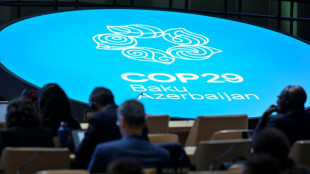
-
 Palestinians welcome ICC arrest warrants for Israeli officials
Palestinians welcome ICC arrest warrants for Israeli officials
-
Senegal ruling party wins parliamentary majority: provisional results

-
 Fiji's Loganimasi in for banned Radradra against Ireland
Fiji's Loganimasi in for banned Radradra against Ireland
-
Brazil police urge Bolsonaro's indictment for 2022 'coup' plot

-
 NFL issues security alert to teams about home burglaries
NFL issues security alert to teams about home burglaries
-
Common water disinfectant creates potentially toxic byproduct: study

-
 Chimps are upping their tool game, says study
Chimps are upping their tool game, says study
-
US actor Smollett's conviction for staged attack overturned

-
 Fears rise of gender setbacks in global climate battle
Fears rise of gender setbacks in global climate battle
-
'World's best coach' Gatland 'won't leave Wales' - Howley

-
 Indian PM Modi highlights interest in Guyana's oil
Indian PM Modi highlights interest in Guyana's oil
-
Israel strikes kill 22 in Lebanon as Hezbollah targets south Israel

-
 Argentina lead Davis Cup holders Italy
Argentina lead Davis Cup holders Italy
-
West Bank city buries three Palestinians killed in Israeli raids

-
 Fairuz, musical icon of war-torn Lebanon, turns 90
Fairuz, musical icon of war-torn Lebanon, turns 90
-
Jones says Scotland need to beat Australia 'to be taken seriously'

-
 Stock markets push higher but Ukraine tensions urge caution
Stock markets push higher but Ukraine tensions urge caution
-
IMF sees 'limited' impact of floods on Spain GDP growth

-
 Volkswagen workers head towards strikes from December
Volkswagen workers head towards strikes from December
-
'More cautious' Dupont covers up in heavy Parisian snow before Argentina Test

-
 UK sanctions Angola's Isabel dos Santos in graft crackdown
UK sanctions Angola's Isabel dos Santos in graft crackdown
-
Sales of existing US homes rise in October

-
 Crunch time: What still needs to be hammered out at COP29?
Crunch time: What still needs to be hammered out at COP29?
-
Spurs boss Postecoglou hails 'outstanding' Bentancur despite Son slur

-
 South Sudan rejects 'malicious' report on Kiir family businesses
South Sudan rejects 'malicious' report on Kiir family businesses
-
Australia defeat USA to reach Davis Cup semis

-
 Spain holds 1st talks with Palestinian govt since recognising state
Spain holds 1st talks with Palestinian govt since recognising state
-
Returning Vonn targets St Moritz World Cup races

-
 Ramos nears PSG return as Sampaoli makes Rennes bow
Ramos nears PSG return as Sampaoli makes Rennes bow
-
Farrell hands Prendergast first Ireland start for Fiji Test

-
 Famed Berlin theatre says cuts will sink it
Famed Berlin theatre says cuts will sink it
-
Stuttgart's Undav set to miss rest of year with hamstring injury

-
 Cane, Perenara to make All Blacks farewells against Italy
Cane, Perenara to make All Blacks farewells against Italy
-
Kenya scraps Adani deals as Ruto attempts to reset presidency

-
 French YouTuber takes on manga after conquering Everest
French YouTuber takes on manga after conquering Everest
-
Special reunion in store for France's Flament against 'hot-blooded' Argentina

-
 'World of Warcraft' still going strong as it celebrates 20 years
'World of Warcraft' still going strong as it celebrates 20 years
-
Fritz pulls USA level with Australia in Davis Cup quarters

-
 New Iran censure looms large over UN nuclear meeting
New Iran censure looms large over UN nuclear meeting
-
The first 'zoomed-in' image of a star outside our galaxy

-
 ICC issues arrest warrants for Netanyahu, Gallant, Deif
ICC issues arrest warrants for Netanyahu, Gallant, Deif
-
Minister among 11 held over Serbia station collapse

-
 Historic gold regalia returned to Ghana's king
Historic gold regalia returned to Ghana's king
-
Kyiv accuses Russia of launching intercontinental ballistic missile attack

-
 Leicester's Fatawu to miss rest of season after Ghana injury
Leicester's Fatawu to miss rest of season after Ghana injury
-
High-flying Bayern face injury woes as crucial phase looms

-
 Verstappen cool on F1 championship hopes in Vegas
Verstappen cool on F1 championship hopes in Vegas
-
Australia's Kokkinakis beats USA's Shelton in Davis Cup thriller

-
 Two-time Olympic triathlon champion Alistair Brownlee retires
Two-time Olympic triathlon champion Alistair Brownlee retires
-
Nationalist raves galvanise traumatised Ukrainian youth


Common water disinfectant creates potentially toxic byproduct: study
A group of chemical compounds used to disinfect water for one-third of the US population and millions of others globally produces a potentially toxic byproduct, according to new research published Thursday, sparking calls for an "immediate" investigation into possible health impacts.
Inorganic chloramines have been used for decades to remove pathogens from public water supplies.
Though chlorine remains the most widely used disinfectant in the US and globally, chloramines have increasingly replaced it in many systems to reduce certain byproducts linked to bladder and colon cancer, low birth weight, and miscarriage.
Today, more than 113 million Americans rely on chloraminated drinking water, with the compound also in use across Canada, Asia, and Europe.
"However, chloramines themselves decompose into products that are poorly characterized," said Julian Fairey, lead author of the study published in the journal Science, during a press briefing.
One such product, identified more than 40 years ago but left chemically unresolved, was simply dubbed the "unidentified product."
Fairey and his team have finally cracked the mystery.
Using a combination of traditional chemistry methods and modern tools like high-resolution mass spectrometry and nuclear magnetic resonance spectroscopy, they identified the compound as "chloronitramide anion."
The compound was detected in all 40 chloraminated drinking water samples tested, with concentrations reaching up to 100 micrograms per liter -- exceeding typical regulatory limits for disinfection byproducts, which range between 60 and 80 micrograms per liter.
Although toxicological studies have yet to be conducted, the researchers sounded a warning.
"The chemical structure looks concerning, as does the concentrations at which this compound is forming, so we certainly think health effects studies are warranted," Fairey said.
Their study calls for the compound to be "an immediate candidate" for quantification in public waters and for closer health and toxicity studies.
Water utilities could consider reverting to chlorine, Fairey suggested, though this would require secondary disinfectants to neutralize the known toxic byproducts chlorine produces.
With further study and regulatory action likely years away, the researchers recommended home filtration systems using activated carbon blocks for people who are concerned.
P.Mira--PC


